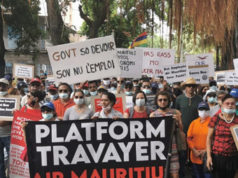It is my pleasure to express myself and my point of view with regards to what is happening to our economy from a ‘finance’ perspective. For you to understand the way I think you have to know my background when it comes to finance.
I have an engineering degree from a UK university and soon after graduation, I started working for one of the biggest banks in the world. My first job in finance was in trading. I then went into client advice and fund management with another major finance company, which eventually led to me setting up my own advisory and management firm in 2005. Along the way, I’ve had to sit many financial exams to earn my practicing license with the UK financial authority. In 2007-2010, I went through one of the deepest and most testing recessions the world had ever seen since the American great depression from 1929-1933. I left London in 2013 and came back to Mauritius and I now run a greenhouse business. The coronavirus that is affecting the whole world right now has already plunged the biggest economies into another recession and many well-known economists are saying that the recession might lead to a depression similar if not worse than the great depression. From the point of view of someone like me; we’ve never really come out of the 2007-2010 recession. Equities and Bonds Markets have remained inflated for some time and there have been signs of the world markets teetering along the edges of a global recession for the past ten odd years. The reason why global markets did not go into another official recession after the 2007-2010 recession is because of ‘quantitative easing’, which put simply is the injection of money into our global financial markets/systems by major central banks.
In Mauritius we have to understand that our economy depends on the health of other economies we do business with. Tourism, which is a pillar of our economy is fully dependent on the influx of tourists. And in our case those tourists are primarily from Europe. Textiles, the outsourcing of services and foreign investments are also dependent on how healthy economies we do business with are in. The fact that we will not see our economy get back on track until the economies we do business with get back to some normality, dictates that the road ahead for Mauritius will be somewhat bumpy and that is putting it mildly.
Whilst major economies have been slashing their central bank base rate (repo rate in Mauritius) to the lowest they have been in their respective histories, our central bank only brought down the repo rate by 1% to 1.85%. I do not think that now is the time to be careful with lowering the cost of borrowing. Many Mauritians will find themselves in financially precarious situations over the next year or so. Small companies and self-employed people who are sole traders and employ other people; that cannot operate right now and have not had any income for the past few weeks are especially at risk. That is the group that have little cash flow and usually have debt and operate on a month to month basis. The elected government of Mauritius has to do more to make cash available to this group at lower interest rates.
We have to accept that the hotel business will not be fully operational for at least another few months or until the world starts relaxing air travel, opening airports and allowing the free movement of people. With that in mind, the Bank of Mauritius has to be careful with the devaluation of the Mauritius Rupee. Businesses and Mauritians will not be able to cope if the major currencies we trade with are over-valued compared to the Mauritius Rupee as that will make everything that we import so much more expensive. At a time when most people in Mauritius are struggling to make ends meet, at a time when a lot of people will find themselves without a job because the company they work for can no longer sustain employees’ salaries, the elected government of Mauritius and the Bank of Mauritius has a duty of care towards Mauritians to make sure that we do not trade affordability for the hope that we get a good inflow of tourists by making the Mauritius Rupee appear cheap to those tourists. We import approximately 83% of our food.
In my humble opinion, our elected decision makers and the decision makers that our elected government has handpicked must act in the benefit of the Mauritius people and businesses in the business of importing food and other important goods by making sure that the Mauritius Rupee is not devalued against major currencies.
The devaluation of the Mauritius Rupee will only benefit a handful of businesses; businesses that are strong, with cash in the bank and can weather the storm ahead. Those are the businesses that banks will willingly lend money to because they are strong and we all know that as soon as the world gets back to some normality these businesses will be operating properly again.
In the short term, say for the next year or so, our elected decision makers and the decision makers that our elected government has handpicked must protect the businesses and self-employed people that are more likely to go under as that is the segment of our economy that employs the most Mauritians.
Wage assistance schemes are good but not enough has been done for self-employed Mauritians. Allowing some breathing space by way of financial engineering using the tools available to the Mauritius Central Bank will help. Let us see if our elected government is more inclined to protect its big political donors or its electors.











